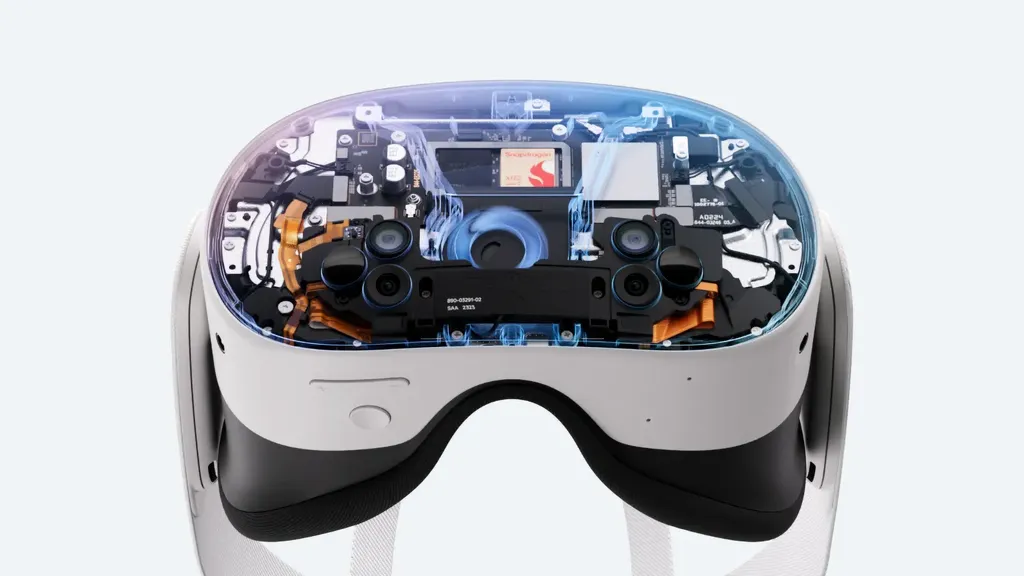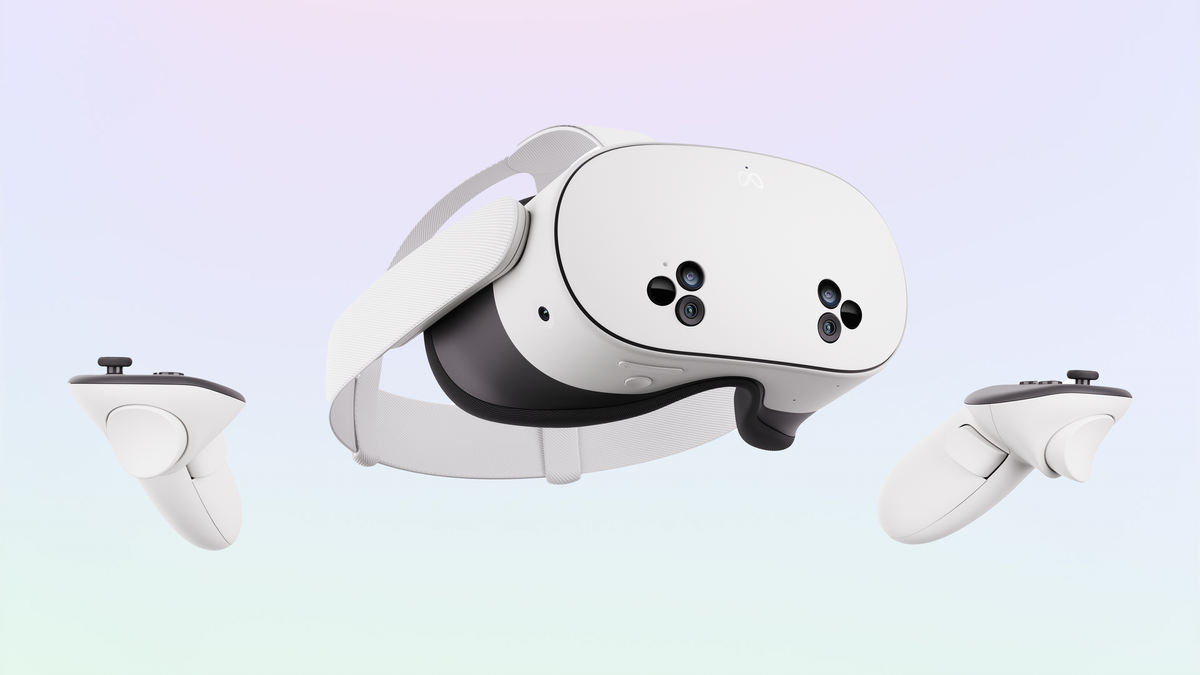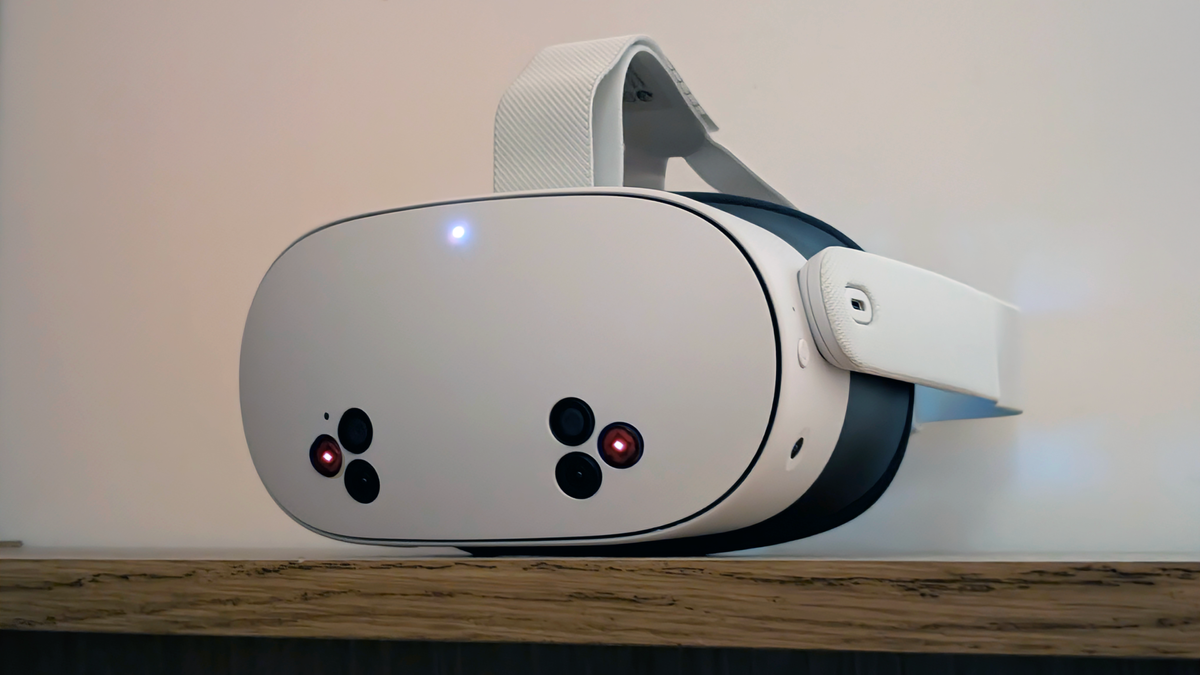Quest 3S starts arriving today, and it comes with the same Snapdragon XR2 Gen 2 chipset as Quest 3. Here’s a detailed rundown of Quest 3S's specifications and features and how those compare to other headsets.
UploadVR received a Quest 3S review only yesterday, and while we've published an interesting initial observation, we'll need to spend at least a few more days with Quest 3S before we can bring you a full review.
In the meantime, here's an on-paper comparison of Quest 3S's specifications to other headsets. Just keep in mind that on-paper specs don't tell the whole story.
For brevity, these charts will only show the differences between Quest 3S and each headset. If something important isn't specified, you can assume it's the same between the two.
Quest 3S Specs vs Quest 3
Quest 3S has the same Snapdragon XR2 Gen 2 chipset and color passthrough mixed reality capabilities as Quest 3, but uses the old fresnel lenses and fixed single panel from Quest 2 to achieve its lower price.
The use of fresnel lenses means Quest 3S has inferior lens clarity compared to Quest 3 and a thicker design. And there are other more minor differences between Quest 3S and Quest 3.
| Quest 3S | Quest 3 | |
| Lens Type | Fresnel | Pancake |
| Field of View | 89-96° × 96° | 110° × 96° |
| Lens Separation | 3-Step 58/63/68mm |
Continuous 58–70mm |
| Supported IPDs | 56-60mm 61-65mm 66-70mm |
53–75mm |
| Glasses Support | Spacer | Eye Relief Adjust |
| Display Type | Single LCD | Dual LCD |
| Pixels Per Eye | ~1680×1870 (est) | 2064×2208 |
| Angular Resolution | 20 PPD | 25 PPD |
| IR Emitters | 2x Flood LEDs | Depth Projector |
| Visor Thickness | 73.9mm | 62.3mm |
| Total Weight | 514 grams | 515 grams |
| Headphone Jack | ❌ | ✅ |
| Battery Life | 2.5 hours (average) |
2.2 hours (average) |
| Proximity Sensor | ❌ | ✅ |
| Action Button | ✅ | ❌ |
| Pricing | $300 (128GB) $400 (256GB) |
$500 (512GB) |
Quest 3S doesn't have a 3.5mm headphone jack, but it does have a new Action Button that toggles between passthrough and immersive VR, replacing the double tap gesture from previous Meta Quest headsets.
Quest 3S also doesn't have a depth projector, which Quest 3 uses to improve the quality of its room meshing capabilities used during mixed reality setup. But it does have two IR flood illuminators, and in our testing so far we've found this means it has better low-light head and hand tracking, including being able to track in the dark.
Quest 3S Specs vs Quest 2
While Quest 3S shares the display and lenses from Quest 2, it has the new Snapdragon XR2 Gen 2 chipset, 2GB extra RAM, color passthrough, infrared emitters, Wi-Fi 6E, and ringless Touch Plus controllers.
The XR2 Gen 2 means Quest 3S has more than twice the GPU power, a higher default rendering resolution, and supports inside-out body tracking and mixed reality scene meshing.
| Quest 3S | Quest 2 | |
| Chipset | Snapdragon XR2 Gen 2 (4nm) |
Snapdragon XR2 Gen 1 (7nm) |
| RAM | 8GB | 6GB |
| Default Render Resolution |
1680×1760 | 1440×1584 |
| 6GHz Wi-Fi 6E | ✅ | ❌ |
| Body Tracking | Upper Body | Head & Hands |
| Passthrough | True Color 18 PPD |
Black & White 4 PPD |
| IR Emitters | 2x Flood LEDs | ❌ |
| Scene Meshing | ✅ | ❌ |
| Visor Thickness | 73.9mm | 93.1mm |
| Total Weight | 514 grams | 503 grams |
| Headphone Jack | ❌ | ✅ |
| Battery Life | 2.5 hours (average) |
1.5-2.5 hours |
| Proximity Sensor | ❌ | ✅ |
| Action Button | ✅ | ❌ |
| Controllers | Touch Plus (Ringless) TruTouch Haptics |
Touch (With Rings) Basic Haptics |
However, there are also a few minor regressions from Quest 2. Quest 3S doesn't have a headphone jack, meaning you need to use USB-C for low-latency private audio. And it doesn't have a proximity sensor, meaning you have to manually toggle standby, as it can't sense when you're wearing it.
Quest 3S Specs vs Quest Pro
Despite launching at a price five times lower than Quest Pro launched at two years ago, Quest 3S is actually superior in key aspects.
It has the new Snapdragon XR2 Gen 2 chipset with a twice as powerful GPU, much higher resolution true color passthrough, infrared emitters, and a higher maximum refresh rate.
| Quest 3S | Quest Pro | |
| Periphery | Closed | Open |
| Lens Type | Fresnel | Pancake |
| Field of View | 89-96° × 96° | 106° × 96° |
| Lens Separation | 3-Step 58/63/68mm |
Continuous 58–70mm |
| Supported IPDs | 56-60mm 61-65mm 66-70mm |
55–75mm |
| Glasses Support | Spacer | Eye Relief Adjust |
| Display Type | Single LCD | Dual QD-LCD |
| Local Dimming | ❌ | ✅ |
| Pixels Per Eye | ~1680×1870 (est) | 1800×1920 |
| Angular Resolution | 20 PPD | 22 PPD |
| Max Refresh Rate | 120Hz | 90Hz |
| Chipset | Snapdragon XR2 Gen 2 (4nm) |
Snapdragon XR2+ Gen 1 (7nm) |
| RAM | 8GB | 12GB |
| Default Render Resolution |
1680×1760 | 1440×1584 |
| Body Tracking | Upper Body | Head & Hands |
| Eye Tracking | ❌ | ✅ |
| Face Tracking | ❌ | ✅ |
| Passthrough | True Color 18 PPD |
Colorized Black & White 6 PPD |
| IR Emitters | 2x Flood LEDs | ❌ |
| Scene Meshing | ✅ | ❌ |
| Visor Thickness | 73.9mm | ~60mm |
| Strap Type | Cloth (Replaceable) |
Rigid Plastic |
| Battery Location | Visor | Rear Padding |
| Total Weight | 514 grams | 722 grams |
| Headphone Jacks | ❌ | 2x |
| Battery Life | 2.5 hours (average) |
1-3 hours |
| Proximity Sensor | ❌ | ✅ |
| Controllers | Touch Plus (Ringless) Handle Haptics |
Touch Pro (Self-Tracking) 3-Point Haptics |
| Pricing | $300 (128GB) $400 (256GB) |
$1000 (256GB) |
However, Quest Pro is superior in other aspects. It has pancake lenses with precise separation adjustment, and its displays have quantum dots for richer colors as well as Mini LED local dimming for deeper contrast.
Quest Pro also has more RAM and included self-tracking controllers, and some people may prefer its open periphery design.
Quest 3S Specs vs Apple Vision Pro
Quest 3S costs almost twelve times less than Apple Vision Pro. Or put another way, it's less than a tenth of the price.
Apple Vision Pro has pancake lenses, offering superior sharpness and a more compact design, significantly higher resolution micro-OLED displays with HDR, the M2 chipset with a 10-core GPU, twice the RAM, eye tracking, face tracking, higher resolution passthrough, and fully automatic IPD adjustment.
| Quest 3S | Apple Vision Pro | |
| Lens Type | Fresnel | Pancake |
| Field of View | Taller | Shorter |
| Lens Separation | Manual 3-Step 58/63/68mm |
Automatic Continuous 51–75mm |
| Glasses Support | Spacer | ❌ |
| Display Type | Single LCD | Dual Micro-OLED |
| HDR | ❌ | ✅ |
| Pixels Per Eye | ~1680×1870 (est) | 3660×3200 |
| Operating System | Horizon OS | visionOS |
| Chipset | Snapdragon XR2 Gen 2 (4nm) w/ 6-core GPU |
Apple M2 (5nm) w/ 10-core GPU |
| RAM | 8GB | 16GB |
| Eye Tracking | ❌ | ✅ |
| Face Tracking | ❌ | ✅ |
| Passthrough | 4MP | 6.5MP |
| LiDAR | ❌ | ✅ |
| Visor Thickness | 73.9mm | ~40mm |
| Weight | 514 grams | 600-650 grams |
| Battery Location | Visor | Tethered External |
| Tracked Controllers | ✅ | ❌ |
| 6GHz Wi-Fi 6E | ✅ | ❌ |
| Proximity Sensor | ❌ | ✅ |
| Passthrough Control | Button | Dial |
| Pricing | $300 (128GB) $400 (256GB) |
$3500 (256GB) $3700 (512GB) $3900 (1TB) |
However, Quest 3S offers a taller field of view than Apple Vision Pro, and comes with precision tracked controllers.
Quest 3S Specs vs Pico 4 Ultra
Quest 3S and Pico 4 Ultra use the same XR2 Gen 2 chipset, the same also used in Quest 3.
But Pico 4 Ultra has pancake lenses with wider & taller field of view, higher resolution displays and passthrough, more RAM, better weight distribution, faster charging speed, Wi-Fi 7, and a proximity sensor.
| Quest 3S | Pico 4 Ultra | |
| Lens Type | Fresnel | Pancake |
| Field of View | 89-96° × 96° | 105° × 105° |
| Lens Separation | 3-Step 58/63/68mm |
Continuous 58–70mm |
| Supported IPDs | 56-60mm 61-65mm 66-70mm |
53–75mm |
| Display Type | Single LCD | Dual LCD |
| Pixels Per Eye | ~1680×1870 (est) | 2160×2160 |
| Angular Resolution | 20 PPD | 21 PPD |
| Max Refresh Rate | 120Hz | 90Hz |
| RAM | 8GB | 12GB |
| Body Tracking | Upper Body | Head & Hands |
| Passthrough | 18 PPD | 20.6 PPD |
| IR Emitters | ✅ | ❌ |
| Depth Sensor | ❌ | ✅ |
| Strap Type | Cloth (Replaceable) |
Semi-Rigid Plastic (Not Replaceable) |
| Battery Location | Visor | Rear Padding |
| Charging Speed | 18W | 45W |
| Proximity Sensor | ❌ | ✅ |
| Action Button | ✅ | ❌ |
| Wi-Fi | 6E | 7 |
| Pricing | €330 (128GB) €440 (256GB) |
€600 (256GB) |
However, Quest 3S has inside-out upper body tracking, infrared emitters for better hand tracking, and is hundreds of euros less expensive.
Of course, in reality the decision to buy Quest 3S or Pico 4 Ultra will more often come down to the software and content differences than anything to do with the hardware.
Quest 3S Specs vs Vive Focus Vision
Quest 3S and Vive Focus Vision both use fresnel lenses, but the similarities pretty much end there.
Quest 3S has the new Snapdragon XR2 Gen 2 chipset with a twice as powerful GPU, inside-out upper body tracking, and a higher maximum refresh rate in standalone mode.
But Vive Focus Vision, on paper at least, is superior in many other ways.
| Quest 3S | Vive Focus Vision | |
| Field of View | 89-96° × 96° | 116° × 96° |
| Lens Separation | Manual 3-Step 58/63/68mm |
Automatic Continuous 57-72mm |
| Supported IPDs | 56-60mm 61-65mm 66-70mm |
57-72mm |
| Display Type | Single LCD | Dual LCD |
| Pixels Per Eye | ~1680×1870 (est) | 2448×2448 |
| Max Refresh Rate | 120Hz | Standalone: 90Hz PC: 120Hz |
| Chipset | Snapdragon XR2 Gen 2 (4nm) |
Snapdragon XR2 Gen 1 (7nm) |
| RAM | 8GB | 12GB |
| Wired PC VR | Compressed via USB |
Lossless via DisplayPort ($150 Adapter) |
| Body Tracking | Upper Body | Head & Hands |
| Eye Tracking | ❌ | ✅ |
| Face Tracking | ❌ | $100 Addon |
| IR Emitters | ✅ | ✅ |
| Depth Sensor | ❌ | ✅ |
| Strap Type | Cloth (Replaceable) |
Semi-Rigid Plastic (Not Replaceable) |
| Battery Location | Visor | Rear Padding |
| Battery Hotswap | ❌ | ✅ |
| Proximity Sensor | ❌ | ✅ |
| Action Button | ✅ | ❌ |
| Headphone Jack | ❌ | ✅ |
| MicroSD Card Slot | ❌ | ✅ |
| Pricing | $300 (128GB) $400 (256GB) |
$1000 (128GB) |
Vive Focus Vision has precise lens separation adjustment, higher resolution displays, more RAM, eye tracking, a depth sensor, battery hotswap, a headphone jack, a microSD card slot, and support for lossless quality PC VR via a $150 DisplayPort adapter. You can also add face tracking to Vive Focus Vision via a $100 addon.
Of course, in reality the decision to buy Quest 3S or Vive Focus Vision will more often come down to the software and content differences than anything to do with the hardware.

































